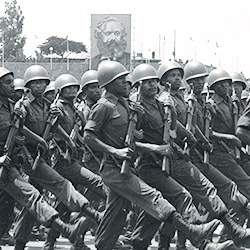In Ethiopia, 5 May is Patriot’s Day or to give it it’s full title – Ethiopian Patriots Victory Day. On this day Ethiopians celebrate the victory over the Italians in 1941. Ethiopia was invaded by the Italians in 1935 with Addis being captured on 5 May 1936. The reasons for the invasions have never been 100% clear – some say it was to avenge the loss the Italians suffered at the hands of the Ethiopians in 1896; others say it was a scheme by Mussolini to draw attention away from his local failures. The church in Italy supported the war as a way of making the savages more civilized and converting the Orthodox to Catholicism.
Emporere Haile Selassie mobilized the Ethiopian Army and ordered all men to go to war and to bring a woman to cook and clean for him. Only those with babies, the blind and the infirm were excused. The Army was about 500 000 men and most of them were untrained. The Arbegnoch or Patriots was a resistance movement which started in 1936. These cells of men and women undertook guerilla tactics to fight the Italians. They continued fighting through out the years of occupation and on 5 May 1941, five years after it was taken by the Italians, Haille Selassie re entered Addis Ababa. The actions of these men and women are still celebrated and held in high esteem.
On 8 May, South Africa held provincial and national elections. Leading up to the elections there were many promises and threats made, protests held and opinions freely given. The country seems to be divided between those who believe the government can do no wrong and those who think they can do nothing right. There are plenty of people who think there is no future in South Africa, who see the outlook as bleak and who think there is no hope.
There is no doubt that we are subject to our government; they have authority over us and our lives are affected by them. However, we often forget that God is in control of all things. He raises up leaders, He controls the way they go and He is sovereign over all. In this time there are many countries with uncertain futures or with unease and questions. Many people are not happy with their government. Let us not despair or be too caught up in politics. Rather let us thank God that He is in control and may we be obedient to pray for those who God has elevated to leadership of our countries. Moreover, let us, be not part of the problem but part of the solutions and may we do what we can for the best of those around us.

 What we know today as Ethiopia began as D’mt about 1000 to 500 BC. It was a contemporary of ancient Egypt and Nubia. Ethiopian tradition claims that the Queen of Sheba who visited Solomon was from Ethiopia and returned from her visit with a child that Solomon fathered – the Solomonic bloodline or claims thereof played a big role in shaping Ethiopian history.
What we know today as Ethiopia began as D’mt about 1000 to 500 BC. It was a contemporary of ancient Egypt and Nubia. Ethiopian tradition claims that the Queen of Sheba who visited Solomon was from Ethiopia and returned from her visit with a child that Solomon fathered – the Solomonic bloodline or claims thereof played a big role in shaping Ethiopian history. Around 100BC the Empire of Aksum was founded and it became one of the 4 big Empires of its day; along with Rome, Persia and China. This was largely bought about as a result of the Roman trading route from Rome through to ancient India. In its prime the Empire extended up into Egypt and is rumoured to have been the cause of the demise of Kush. It also had territories across the sea into modern day Yemen. The Aksum Empire was Christian since about 325 AD but the rise of the Arab empire led to the decline of Aksum until it was completely overthrown in 1000AD.
Around 100BC the Empire of Aksum was founded and it became one of the 4 big Empires of its day; along with Rome, Persia and China. This was largely bought about as a result of the Roman trading route from Rome through to ancient India. In its prime the Empire extended up into Egypt and is rumoured to have been the cause of the demise of Kush. It also had territories across the sea into modern day Yemen. The Aksum Empire was Christian since about 325 AD but the rise of the Arab empire led to the decline of Aksum until it was completely overthrown in 1000AD. The Zegwe Dynasty followed. One of the leaders was Gebre Lalibela who built the famous stone churches – whole churches which were hewn out of rock and can still be visited today. The Zegwe were not direct descendants of Solomon so they were overthrown in 1270 by those who claimed direct lineage. The Age of Princes started in 1769 and was a time of great turmoil and fighting. There was no central control and multiple ‘princes’ fought for their territories. They were all finally united under Tewodros II in 1855.
The Zegwe Dynasty followed. One of the leaders was Gebre Lalibela who built the famous stone churches – whole churches which were hewn out of rock and can still be visited today. The Zegwe were not direct descendants of Solomon so they were overthrown in 1270 by those who claimed direct lineage. The Age of Princes started in 1769 and was a time of great turmoil and fighting. There was no central control and multiple ‘princes’ fought for their territories. They were all finally united under Tewodros II in 1855. Ethiopians take great pride in the fact that they held of being colonized for the longest. In 1874 they defeated the Egyptians and in 1894 the Italians tried to invade but to no avail. Under the leadership of Haile Selassie they were able to maintain control of their own country until Mussolini invaded in 1935 and the Italians had control of the country until 1941 when the British helped the Ethiopians to reclaim their country. Haile Selassie was reinstated and kept control until 1974.
Ethiopians take great pride in the fact that they held of being colonized for the longest. In 1874 they defeated the Egyptians and in 1894 the Italians tried to invade but to no avail. Under the leadership of Haile Selassie they were able to maintain control of their own country until Mussolini invaded in 1935 and the Italians had control of the country until 1941 when the British helped the Ethiopians to reclaim their country. Haile Selassie was reinstated and kept control until 1974. He was overthrown by the Provisional Military Government of Socialist Ethiopia, known as the DERG for short. There was a tragic time of fighting and genocide known as the Red Terror in which hundreds of thousands of Ethiopians were killed. The fighting was politically motivated between DERG and Ethiopian People’s Revolutionary Party. The DERG fell in 1991 and a transitional government existed until 1995 when the first multiparty election took place. This was won by Ethiopian People’s Revolutionary Democratic Front who retain control today.
He was overthrown by the Provisional Military Government of Socialist Ethiopia, known as the DERG for short. There was a tragic time of fighting and genocide known as the Red Terror in which hundreds of thousands of Ethiopians were killed. The fighting was politically motivated between DERG and Ethiopian People’s Revolutionary Party. The DERG fell in 1991 and a transitional government existed until 1995 when the first multiparty election took place. This was won by Ethiopian People’s Revolutionary Democratic Front who retain control today. Unfortunately there are still those who believe that elections are rigged and that reforms have been too long in coming. This culminated in protests in 2016 against humans rights abuses; political prisoners and distribution of wealth. The Prime Minister resigned in February 2018 to make way for reforms leading to a 6 month state of emergency which is still in place.
Unfortunately there are still those who believe that elections are rigged and that reforms have been too long in coming. This culminated in protests in 2016 against humans rights abuses; political prisoners and distribution of wealth. The Prime Minister resigned in February 2018 to make way for reforms leading to a 6 month state of emergency which is still in place.